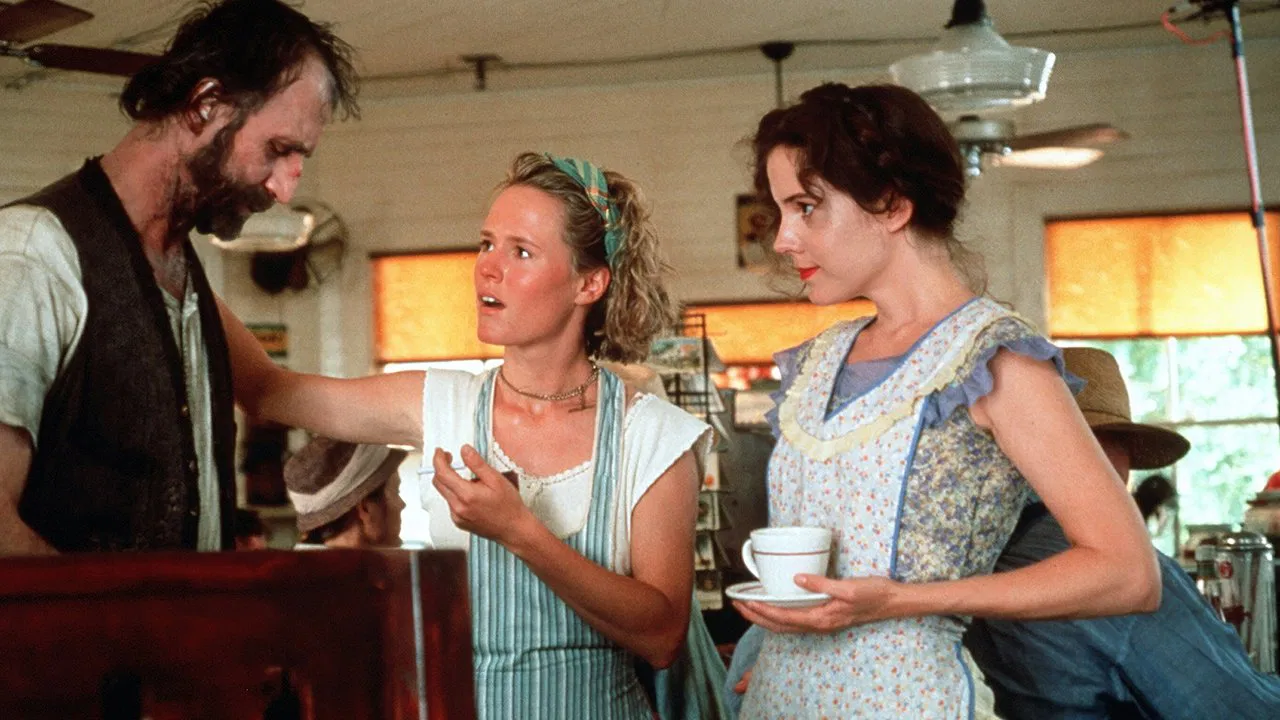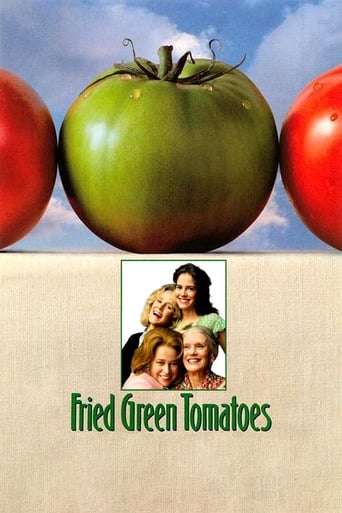

What makes it different from others?
... View MoreTells a fascinating and unsettling true story, and does so well, without pretending to have all the answers.
... View MoreGood films always raise compelling questions, whether the format is fiction or documentary fact.
... View More.Like the great film, it's made with a great deal of visible affection both in front of and behind the camera.
... View MoreAnyone else think that Idgie and Ninny were the same person? I didn't catch any other reviews who broached the topic, but the FAQ page for this movie addresses the topic from opposite perspectives. I'll tell you what I think at the end.This movie is over a quarter century old and I just got around to it. That happens sometimes and after seeing one like that, I have to wonder why it took so long. I enjoyed this one for it's story telling style and gentle humor. Going in, if the only thing you've seen is the DVD sleeve, you would think the story is about four women of varying ages who become friends during a particular time and place. Instead, it spans the generations with the principal characters and story taking place in the 1920's, while the flashbacks to that era occur roughly during the time the picture was made. It's not an unusual filming technique but here it worked especially well.This is an unusual love story but not in the traditional sense. Ruth Jamison (Mary-Louise Parker) and Idgie Threadgoode (Mary Stuart Masterson) become fast friends after a bit of a rough start, and their relationship grows stronger over the period of time that transitions from teenage years to young adulthood. The bond is cemented when Idgie and her friend George (Stan Shaw) save Ruth from a disastrous marriage. The plot thickens at this point, and it takes an additional five years to come to terms with the disappearance of Ruth's husband shortly after the incident at Frank Bennett's (Nick Searcy) farm. The only disconnect I have with the story is the way Idgie and George were arrested for the murder of Frank Bennett. There was absolutely no grounds for the arrest to my thinking. Idgie did make a statement that she would 'kill Frank' if he ever came by to harm Ruth again, but that was stated in the heat of the moment. Sheriff Curtis Smoote (Raynor Scheine) using that as a pretext for arresting Idgie didn't make any sense to me at all. Not only that, but the truck recovered from the swamp had no body in it. That should have been enough to preclude any kind of murder trial. Be that as it may, I got a kick out of the judge dismissing the case because as he rightly proclaimed, it wasn't a case at all. The Reverend Scroggins (Richard Riehle) swearing on a copy of 'Moby Dick' was a neat bonus.But there was another facet of the cross examination that bothered me as well. When Ruth was pressed by the prosecuting attorney as to the reason why she left her husband, she replied that it was because Idgie was the person she loved the most in the whole world. Why couldn't she have said that it was because her husband beat her? Leaving that out of the script seemed like an unforced error that would have exonerated Ruth favorably. The story didn't need it as it turned out, but still, that bothered me. Taken all together though, this was a fine story of friendship and loyalty with enough of those little home spun tales thrown in to make it endearing. Like Buddy's (Chris O'Donnell) 'oyster/pearl' analogy and the one about the geese moving the lake out of state. I'm going to remember those for the grand-kids. I think they'll get a kick out of 'em.Oh, and by the way, even though the book that this film was based on had Idgie and Ninny (Jessica Tandy) as separate people, I think there was enough ambiguity at the finish to make them one and the same in this movie. I think Evelyn (Kathy Bates) would agree.
... View MoreSo many have praised this film. The naysayers don't seem to like women, or feel threatened by the portrayal of the men in this story. Let's face it. Racism and women bashing has been such a part of this world, let's not get carried away by a film that puts women in a positive light as they face off against this threat. This is a story of survival. Survival from an ugly force, founded on physical violence and drunkenness. When the women begin to look out for each other's needs, it's when they become energized. From Kathy Bates, who hears the story, to the final outcome, this gets more and more interesting. Fanny Flagg's book comes to life as Idgie becomes one of literature's and cinema's most wonderful characters. I will never forget the barbecue scene. Of course, reviewers seldom mention the scene in the parking lot. That's worth the price of admission.
... View MoreFried Green Tomatoes is one of those films that presents two narratives, simultaneously woven together and unbound by the laws of past and present. A character from the present tells tales of the past, and the film jumps ever back and forth between the two, until a connection emerges. You've seen it in stuff like The Notebook, where it works beautifully, and both stories support each other. That's the issue with this film: One of the narratives is lovely and works quite well. The other? Mmm not so much. Kathy Bates plays a hospice worker in a retirement home who is charmed by stories of life, freedom, injustice and romance from long ago, all told with wit and passion by an excellent Jessica Tandy. She tells of life growing up during the early 1900's in the American southwest, of free spirited tomboy Idgie (a fierce and emotional Mary Stuart Masterson), the girl she loves (Mary Louise Parker, radiant) and the whirlwind of trouble and conflict going on around them. Idgie lost her brother and best friend (a short lived and very young looking Chris O 'Donnell) to a horrible accident, and sort of has a lost pup complex, holding on to Parker for dear life and trying her best to extricate her from an abusive relationship with her monster of a husband (Nick Searcy is evil incarnate). It's whimsical, touching and flavored with just the right touches of sadness and danger. Now, the story with Bates in the present just feels aloof and silly. The scenes with her and Tandy fare better than glimpses of her home life and attempts to empower and change her for the better. Don't get me wrong, I love that idea, the notion of inspiration transcending time and the ability to help others simply with the spoken word and the wisdom of the past, but it just didn't work in this case. As for the scenes in the past, I fell hard for them. Masterson is a terrific actress who usually gets saddled with light, fluffy roles, but here gets a chance to let some raw emotion out. Parker is more reigned in but every bit as soulful, as the girl in a situation no one should have to endure, her soul practically screaming out through those beautiful brown eyes. I suppose you could say that it's half of a great film, that couldn't quite pull off it's own narrative flow.
... View MoreHere's masterful work that imbues you to it through its realism. A housewife who is unhappy with her life befriends an old lady in a nursing home and is enthralled by the tales she tells of people she used to know. This is the kind of film that proves that a small story can be much more meaningful than a larger one. The only thing that keeps it afloat is the sensitivity of the relationships. I found the acting to be sensational, the dialogue incredible and the director's abilities to be up to par and then some. I really like this type of film, as it reminds me of French movies where it's more about the characters and their environment.
... View More